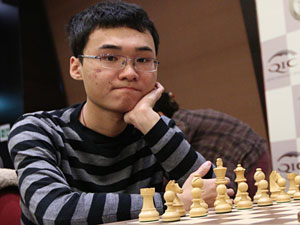



The Qatar Masters Open 2014 was held from November 25 to December 5 at the Crowne Plaza Hotel in Doha, Qatar. There were 92 grandmasters participating, or 60% of the 154 total players. 56 GMs were rated over 2600, and an incredible 14 over 2700. Let those numbers sink in for a moment! This tournament truly was a convention of brilliant chess minds.
After eight hard-fought rounds, there was still a ninth and final round to be played on Thursday here in Doha, Qatar. The leader going into the last round was former World Champion GM Vladimir Kramnik, who was simply rampaging through everyone after a slow start. This was evidenced by his six game winning streak, which put him on an astronomical 7.0/8! Top seed, GM Anish Giri, who had started off with a phenomenal 6.0/6, one win short of a “caruana,” had slipped to joint third after sudden back-to- back losses against Kramnik and Yu Yangyi, a talented Chinese junior who rejoined the 2700 club last month. This all resulted in a final round showdown between Kramnik and Yangyi, to determine the winner of the strongest open tournament ever.
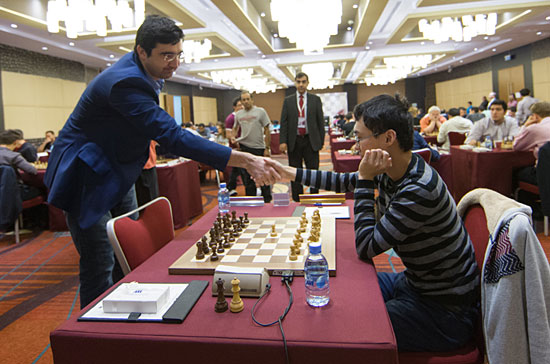
The start of the decisive final round: Vladimir Kramnik vs Yu Yangyi
Kramnik needed only a draw to secure the victory, and so, as expected, he played his trademark Berlin, a line knows for its solidity. Yangyi responded with a quiet positional line 5.Bxc6!?, a move which is probably not sufficient for an advantage, but is just aiming to get a playable position without much risk (Magnus Carlsen-esque). It seemed harmless enough for Black, when suddenly things started tilting in White’s favor as Yangyi built up a pleasant positional advantage. A few moves later Kramnik made an erroneous recapture which gave White a strong advantage. Knowing it was only a matter of time before his position collapsed, Kramnik gave up material to try and generate some play on White’s king. But with surgical precision, Yangyi navigated through the minor complications and emerged victorious. After uprooting the two top seeds, Yu Yangyi became the deserving winner of the Qatar Masters 2014!
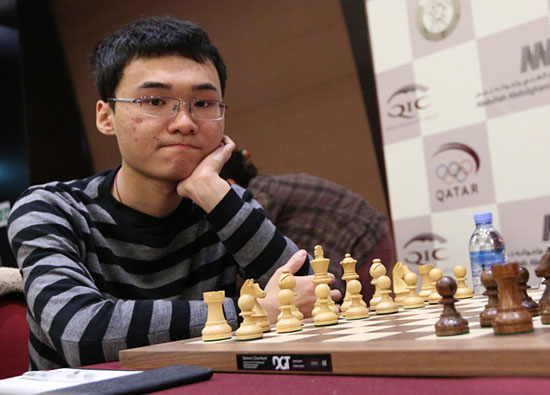
This victory must have felt extra special for Yangyi, as he had narrowly missed out at a chance for first place at the Millionaire Chess tournament in October. With this result, he adds 25 rating points, and is now number 24 in the world in the live ratings, at a hefty 2730! None of the bookmakers saw this coming at the beginning of the tournament, and Yangyi turned out to be the surprise winner. The Dark Horse from the Chinese city of Huang Shi swept in and took away the beautiful first place trophy, and a rewarding $25,000 prize for his efforts.
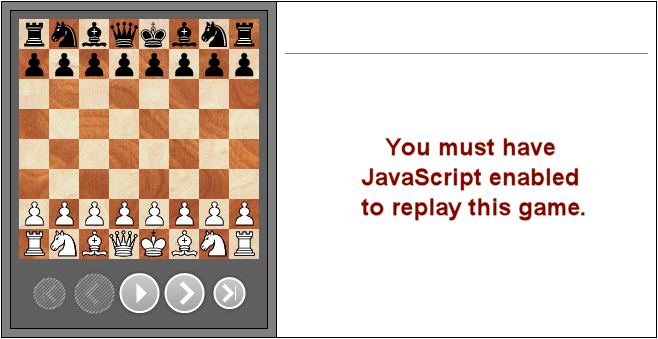
[Event "Qatar Masters 2014"] [Site "?"] [Date "2014.12.04"] [Round "9"] [White "Yu, Yangyi"] [Black "Kramnik, Vladimir"] [Result "1-0"] [ECO "C65"] [WhiteElo "2705"] [BlackElo "2705"] [Annotator "Sagar Shah"] [PlyCount "65"] [EventDate "2014.??.??"] {Kramnik was leading the tournament by a half point and a draw would secure him the first place. In such a situation it was quite likely that he would go for the Berlin Defence, the opening that had helped him to become a World Champion!} 1. e4 e5 2. Nf3 Nc6 3. Bb5 Nf6 4. d3 {Yu Yangyi declines the offer to enter the Berlin Endgame.} Bc5 5. Bxc6 dxc6 6. Nbd2 (6. Nxe5 {Taking the pawn loses a piece due to} Qd4 7. Be3 Qxe5 8. d4 Qxe4 9. dxc5 Qxg2 $19) 6... Be6 {Kramnik would like to defend the pawn on e5 with Nd7, but before that he develops his bishop.} 7. O-O (7. Ng5 $2 Bxf2+ $1 8. Kxf2 Ng4+ {followed by Qxg5 and Black has won a pawn.}) 7... Nd7 8. Nb3 Bb6 (8... Be7 {is another possibility stopping Ng5, but after} 9. d4 {White has the slightly more pleasant position.}) 9. Ng5 {Only two games have reached this position before and both of them continued with Ng5 and in both the games. The white players, Naiditsch and Spragget lost. Yesterday against Giri also Yu Yangyi chose a line that had been lost by Aleksandrov and Palac. It seems as if the Chinese is wants to focus on lines that have had bad results for the colour that he plays, and trying to find improvements in them.} Bxb3 10. axb3 f6 11. Nf3 Nf8 12. Nd2 (12. Nh4 {was played in the game Spragett- Fressinet}) 12... Ne6 13. Qh5+ $5 {The computer's first choice. The idea is to loosen up the dark squares on the kingside to some extent.} g6 14. Qd1 Bc5 {Kramnik starts to get a little too ambitious from this point onwards.} (14... O-O {looked obvious.}) 15. Nc4 b5 16. Na5 Qd7 17. Be3 Bb6 (17... Bxe3 18. fxe3 $14 {One of the points of forcing g6 can be seen now. The f6 pawn is quite weak.}) 18. b4 (18. Qd2) 18... O-O 19. Qd2 f5 $6 {Kramnik tries to play for an attack where none exists. } (19... c5 {would have been a typical Kramnik move trying to neutralize the small edge that White has in this position.}) (19... Nd4 20. Bxd4 (20. Ra3 f5 $5) 20... Bxd4 21. Nb3 Bxb2 22. Ra6 $14) 20. exf5 gxf5 $6 {And now the black position is filled with weaknesses, which Yu Yangyi exploits in perfect fashion. Look closely at how the Chinese plays almost flawless chess from this point onwards.} (20... Rxf5 {was definitely better.}) 21. Qc3 $1 {[%csl Rc6, Re5][%cal Gc3c6,Gc3e5] A very simple double attack.} f4 (21... Nd4 22. Bxd4 Bxd4 23. Qxc6 Qxc6 24. Nxc6 Bxb2 25. Rxa7 Rxa7 26. Nxa7 $16 {White is a pawn up without much compensation.}) 22. Bxb6 cxb6 23. Nxc6 {I wonder what Kramnik was thinking when made the previous moves. Did he underestimate his opponent? Did he think that he could trick Yu Yangyi from any position? The Chinese shows that he is not a player to be messed with.} Qd6 $2 {Giving up another pawn and for what?} (23... Nd4 24. Nxd4 exd4 25. Qd2 $16 {is a thoroughly depressing position. But at least Black has some chances for a kingside attack here.}) 24. Rxa7 $1 (24. Nxe5 {Maybe Kramnik was hoping for this move when he had prepared} Nd4 $1 (24... Rac8 25. Qb3 Qxe5 26. Rfe1 $18) 25. Rae1 Rac8 $132 {With some counterplay.}) 24... Rxa7 25. Nxa7 {Two pawns down with some vague chances of attack – not a good position to be in in the crucial last round.} f3 26. Qc6 {Another precise move!} Qe7 27. Nxb5 Kh8 (27... fxg2 {was not a problem for White, as after} 28. Kxg2 Nf4+ 29. Kh1 $18 {he has everything under control.}) (27... Qg5 {doesn't work because the e6 knight falls with check.} 28. Qxe6+ $18) 28. g3 Qf7 {Kramnik is hoping against hope that he can get some counterplay with the idea of Qf5-h3. But Yu Yangyi has it all covered. } 29. Ra1 $1 Ng5 (29... Qf5 30. Ra8 $1 Qh3 (30... Rxa8 31. Qxa8+ Kg7 32. Nd6 $18) 31. Rxf8+ Nxf8 32. Qxf3 $18) 30. Ra8 Qe7 31. h4 Nh3+ 32. Kf1 e4 {You do not get to see Kramnik giving up free pawns, as if in dejection.} 33. Qxe4 $18 {Four pawns down, Kramnik had had enough. He resigned and that allowed Yu Yangyi to take the title with a score of 7.5 out of nine.} 1-0
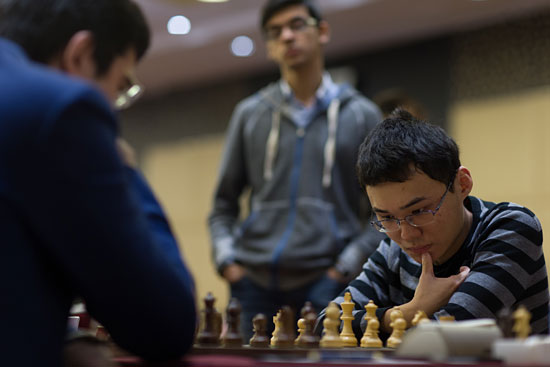
The winner Yu Yangyi in action, watched by his opponent Kramnik and kibitzer Anish Giri
Kramnik was not at all in his element in the last round. He played recklessly sacrificing his pawns without any clear compensation. The round starting three hours earlier than the usual time everyday could have played a role in Kramnik's poor play. But full credit to Yu Yangyi for taking advantage of all the mistakes made by his opponent. He was accurate right upto the last move. Beating two 2750+ opponents (Giri and Kramnik) in two consecutive rounds is really an awesome feat! And he is just 20 years old! A bright and dazzling future awaits this young Chinese player.
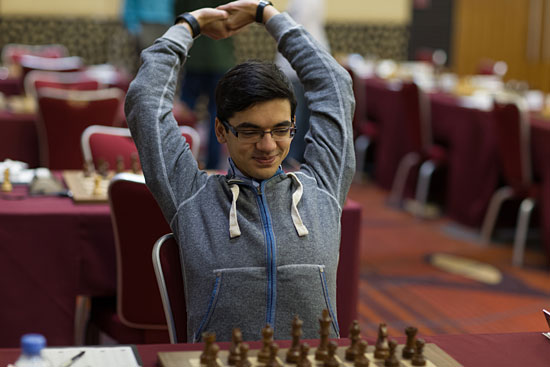
Anish Giri had suffered two back to back losses in the last two rounds. But today it seemed he came refreshed to the game and full of energy. He was able to exploit the small inaccuracy made by his opponent, Vladimir Akopian. But the game soon turned wild and it could have been anyone's game. Giri proved to be the man with superior nerves.
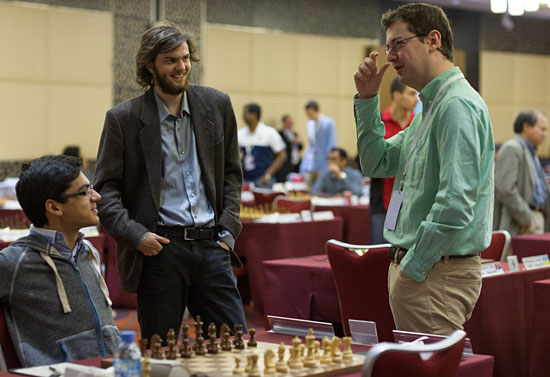
High-level GM chat before the start of the game: Anish Giri, Nils Grandelius, Erwin l'Ami

[Event "Qatar Masters Open"] [Site "?"] [Date "2014.12.04"] [Round "9"] [White "Akopian, Vladimir"] [Black "Giri, Anish"] [Result "0-1"] [ECO "B48"] [WhiteElo "2657"] [BlackElo "2657"] [Annotator "Sagar Shah"] [PlyCount "106"] [EventDate "2014.??.??"] 1. e4 c5 2. Nf3 e6 3. d4 cxd4 4. Nxd4 Nc6 {It's the Sicilian Taimanov and not the Kan that Anand played against Carlsen in the World Championship Match.} 5. Nc3 Qc7 6. Be3 a6 7. Qd2 {Akopian goes for the sharpest line in the Taimanov: the English Attack.} Nf6 8. O-O-O Bb4 (8... Ng4 {is bad due to} 9. Bf4 e5 10. Nd5 Qd8 11. f3 Nf6 12. Nxf6+ Qxf6 (12... gxf6 13. Nxc6 $16) 13. Bg5 $16) 9. f3 Ne5 10. Nb3 b5 11. Kb1 {A little move creating the threat of Nxb5, as now Bxd2 would not be with check.} Be7 12. Qf2 Bb7 (12... d6 {is the main move here, but what Giri plays is not at all bad and looks quite logical too.}) 13. Bb6 ( 13. Bc5 {could be considered, because the natural d6 runs into} d6 14. Bxb5+ $1 axb5 15. Nxb5 Qc6 16. Nxd6+ Bxd6 17. Rxd6 {and White has excellent compensation.}) 13... Qb8 14. Bd4 d6 15. g4 b4 16. Na4 $2 {Akopian commits an error right out of the opening and Giri is extremely quick to punish it.} (16. Ne2 {was necessary and the position is quite normal.}) 16... Nxf3 $1 {Look how in this variation the placement of the knight on a4 is the cause of all the problems for White.} 17. Qxf3 {Though objectively this might not be the best move, Akopian with all his years of experience realises that this variation might give him the best practical chances. And his intuition was not incorrect. } (17. Bxf6 Bxf6 18. Qxf3 (18. Nb6 Bxe4 19. Nxa8 Qxa8 $15 {With two pawns for an exchange and two powerful bishops, Black is extremely comfortable.}) 18... Bc6 $1 {and the knight on a4 is trapped.}) 17... Bxe4 18. Qh3 Bxh1 19. g5 Ne4 20. g6 {The position becomes extremely sharp. White is an exchange and two pawns down, and now he is giving up a third pawn. But Black has to be careful. Not only is his king in the center but also the white pieces are very active.} f6 $6 (20... Ng5 {was the best.} 21. gxf7+ Kxf7 22. Qg3 Bc6 $13) 21. Qxe6 $6 ( 21. Be3 $3 {was the very difficult move to find but the best move in the position. The idea is to clear the d4 square for the knight from where it will attack the weak pawn on e6. At the same time, whenever the black knight comes to g5, it will be chopped off by the bishop.} f5 22. Nd4 $16 {With a huge, huge attack!}) 21... Ng5 $1 {Now things return to normal.} 22. Qe3 hxg6 23. Nb6 Ra7 24. Bd3 Rxh2 25. Bxg6+ (25. Nc5 $5 {Akopian played this on the next move.} dxc5 26. Bxg6+ Kf8 27. Bxc5 {I would be extremely scared to play this position as Black, but the computer thinks that he is fine after} Kg8 28. Bxe7 Bf3 $15) 25... Kf8 26. Nc5 Bc6 (26... dxc5 27. Bxc5 {Giri wants to avoid opening the position.}) 27. Ne6+ Nxe6 28. Qxe6 Be8 29. Bd3 {Bc4 is now a big threat.} Rc7 ( 29... Bf7 30. Nd7+ Rxd7 31. Qxd7 $15 {and with two extra pawns Black is doing fine. But his king in the center might cause him problems in the game.}) 30. Re1 (30. Bc4 Rxc4 31. Qxc4 Qb7 $19) (30. Rg1 $1 {was the best.} Rh6 (30... Qb7 $2 31. Be4 $16 {[%cal Ge4d5]}) 31. Be3 $13 (31. Be4 Bf7 $17) (31. Bxa6 d5 $15)) 30... Qd8 (30... d5 {was the best.} 31. Nxd5 Bf7 $17) 31. Nd5 Bf7 32. Qe4 Rd7 ( 32... Bxd5 33. Qxd5 {and the light square weaknesses in Black's position gives him excellent compensation.}) 33. Nf4 $2 {allows Black to now free himself with } (33. Nb6 Rc7 (33... d5 34. Qf4 $11) 34. Nd5 $13) 33... d5 $1 $19 {Now Giri finishes off the game well.} 34. Ng6+ Bxg6 35. Qxg6 Rh6 36. Qg2 Bd6 {Black has co-ordinated himself relatively well, and soon the extra material will tell.} 37. Rg1 Rh4 38. Qxd5 $2 {Maybe this move was the result of time pressure.} (38. Bf2 {was better} Rh2 39. Qxd5 Rxf2 $2 (39... g5 $17 {Black can continue trying to win.}) 40. Bc4 $1 Bg3 41. Qg8+ Ke7 42. Qe6+ Kf8 43. Qg8+ $11) 38... Be7 39. Qg2 Rdxd4 {Black is now a complete rook up and there is nothing except for a few checks for White.} 40. Qxg7+ Ke8 41. Qg6+ Kd7 42. Qf5+ Kc7 43. Qa5+ Kb8 44. Qxa6 Rd6 45. Qa4 Qb6 {The checks have come to an end and Black has co-ordinated himself well.} 46. Re1 Rg4 47. b3 (47. Rxe7 Qg1+ $19) (47. Qe8+ Bd8 $19) 47... Rg1 48. Bf1 Rd8 49. a3 Bf8 50. Ka2 Qc5 51. axb4 Qxb4 (51... Qxc2+ {was also winning.}) 52. Qa6 Rg5 53. Kb2 Ra5 0-1
The game was crazily complicated. After the opening inaccuracy with 16.Na4, Akopian played really well to take the best possible practical chance. At some point it was even possible for him to be better but only with computer like play. In the game, Giri turned out to be the much superior player. With this win, Anish moved to the second place ahead of Kramnik. After being on a high with 6.0/6 and then on a low with 0/2, it was nice to see Anish finish off the tournament on a winning note and take the second place.
| Rk. | Sd. | Ti. | Name | FED | Rtg | Pts. | TB1 | TB2 | TB3 |
| 1 | 13 | GM | Yu Yangyi | CHN | 2705 | 7.5 | 2905 | 47.0 | 50.5 |
| 2 | 1 | GM | Giri Anish | NED | 2776 | 7.0 | 2870 | 48.0 | 52.5 |
| 3 | 2 | GM | Kramnik Vladimir | RUS | 2760 | 7.0 | 2829 | 48.0 | 52.5 |
| 4 | 19 | GM | Sjugirov Sanan | RUS | 2673 | 6.5 | 2774 | 43.5 | 47.0 |
| 5 | 42 | GM | Durarbayli Vasif | AZE | 2621 | 6.5 | 2734 | 43.5 | 46.5 |
| 6 | 28 | GM | Efimenko Zahar | UKR | 2644 | 6.5 | 2733 | 42.5 | 46.0 |
| 7 | 62 | GM | Salem A.R. Saleh | UAE | 2586 | 6.0 | 2775 | 48.0 | 51.0 |
| 8 | 39 | GM | Volokitin Andrei | UKR | 2627 | 6.0 | 2753 | 45.0 | 47.5 |
| 9 | 4 | GM | Vachier-Lagrave Maxime | FRA | 2751 | 6.0 | 2743 | 44.0 | 48.0 |
| 10 | 10 | GM | Tomashevsky Evgeny | RUS | 2714 | 6.0 | 2734 | 44.5 | 47.5 |
| 11 | 31 | GM | Shankland Samuel L | USA | 2642 | 6.0 | 2732 | 44.0 | 47.5 |
| 12 | 45 | GM | Perunovic Milos | SRB | 2619 | 6.0 | 2727 | 48.0 | 51.5 |
| 13 | 8 | GM | Eljanov Pavel | UKR | 2719 | 6.0 | 2725 | 42.5 | 46.5 |
| 14 | 30 | GM | Ivanisevic Ivan | SRB | 2643 | 6.0 | 2723 | 46.0 | 50.5 |
| 15 | 11 | GM | Bu Xiangzhi | CHN | 2707 | 6.0 | 2720 | 41.5 | 44.5 |
| 16 | 14 | GM | Moiseenko Alexander | UKR | 2701 | 6.0 | 2719 | 43.0 | 47.5 |
| 17 | 5 | GM | Ding Liren | CHN | 2730 | 6.0 | 2718 | 40.0 | 43.5 |
| 18 | 38 | GM | Safarli Eltaj | AZE | 2628 | 6.0 | 2694 | 41.5 | 45.0 |
| 19 | 25 | GM | Movsesian Sergei | ARM | 2659 | 6.0 | 2692 | 41.5 | 45.5 |
| 20 | 26 | GM | Akopian Vladimir | ARM | 2657 | 6.0 | 2684 | 43.0 | 47.5 |
| 21 | 41 | GM | Salgado Lopez Ivan | ESP | 2622 | 6.0 | 2669 | 38.5 | 41.5 |
| 22 | 7 | GM | Jobava Baadur | GEO | 2722 | 6.0 | 2664 | 38.0 | 41.0 |
| 23 | 32 | GM | Vovk Andrey | UKR | 2640 | 6.0 | 2654 | 42.0 | 46.0 |
| 24 | 36 | GM | Adhiban B. | IND | 2630 | 6.0 | 2612 | 37.0 | 37.5 |
| 25 | 69 | GM | Grandelius Nils | SWE | 2573 | 5.5 | 2728 | 49.0 | 51.5 |
| 26 | 44 | GM | Oleksienko Mikhailo | UKR | 2620 | 5.5 | 2719 | 45.5 | 49.5 |
| 27 | 84 | GM | Khotenashvili Bela | GEO | 2504 | 5.5 | 2716 | 43.5 | 47.5 |
| 28 | 3 | GM | Mamedyarov Shakhriyar | AZE | 2757 | 5.5 | 2698 | 42.5 | 46.0 |
| 29 | 12 | GM | Kryvoruchko Yuriy | UKR | 2706 | 5.5 | 2690 | 45.0 | 49.5 |
| 30 | 6 | GM | Harikrishna P. | IND | 2725 | 5.5 | 2689 | 41.0 | 45.0 |
| 31 | 70 | GM | Cornette Matthieu | FRA | 2566 | 5.5 | 2686 | 45.5 | 49.5 |
| 32 | 43 | GM | Naroditsky Daniel | USA | 2620 | 5.5 | 2679 | 42.5 | 45.5 |
| 33 | 16 | GM | Cheparinov Ivan | BUL | 2684 | 5.5 | 2658 | 41.5 | 45.5 |
| 34 | 34 | GM | Romanov Evgeny | RUS | 2636 | 5.5 | 2630 | 41.5 | 45.0 |
| 35 | 18 | GM | Melkumyan Hrant | ARM | 2678 | 5.5 | 2630 | 39.0 | 43.0 |
| 36 | 27 | GM | Mamedov Rauf | AZE | 2652 | 5.5 | 2626 | 40.5 | 44.0 |
| 37 | 56 | GM | Miton Kamil | POL | 2601 | 5.5 | 2621 | 38.0 | 41.0 |
| 38 | 20 | GM | Berkes Ferenc | HUN | 2669 | 5.5 | 2599 | 38.5 | 43.0 |
| 39 | 33 | GM | Rakhmanov Aleksandr | RUS | 2636 | 5.5 | 2580 | 38.5 | 42.0 |
| 40 | 71 | GM | Gabuzyan Hovhannes | ARM | 2565 | 5.5 | 2570 | 34.5 | 37.0 |
| 41 | 49 | GM | Swiercz Dariusz | POL | 2616 | 5.5 | 2550 | 36.0 | 38.5 |
| 42 | 107 | GM | Sundararajan Kidambi | IND | 2415 | 5.5 | 2549 | 33.5 | 36.0 |
| 43 | 47 | GM | Hamdouchi Hicham | FRA | 2616 | 5.5 | 2542 | 36.5 | 40.0 |
Standings and results of all 150 players here

Best female player was Bela Khotenashivili, with 5.5/9 and a performance of 2716
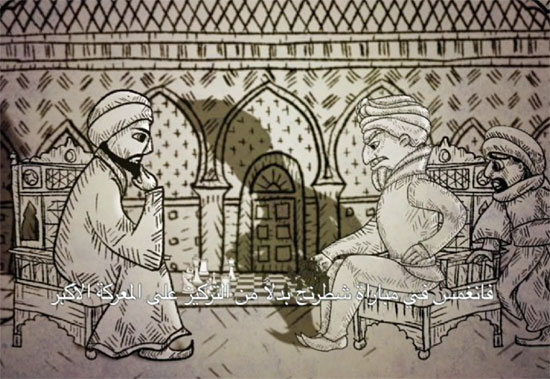
| The top games will be broadcast live on the official web site and on the chess server Playchess.com. If you are not a member you can download a free Playchess client and get immediate access. You can also use ChessBase 12 or any of our Fritz compatible chess programs. |